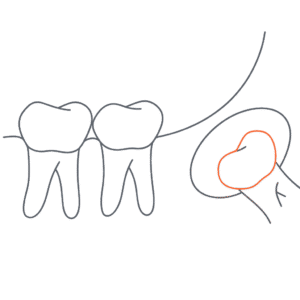Jaw Cysts
What Is a Jaw Cyst?
A jaw cyst is a fluid-filled sac that forms inside the jawbone. These are not cancerous. Cysts can develop around:
- The roots of teeth (especially infected or damaged ones)
- Teeth that haven’t come through (buried or impacted teeth)

Why Do Jaw Cysts Form?
Cysts usually form due to:
- Infection from a damaged or decayed tooth
- Tissue that forms around buried teeth
- Leftover cells from when your teeth first developed
What Problems Can They Cause?
Jaw cysts usually grow slowly, and many people don’t know they have one until it shows up on an X-ray. However, cysts can:
- Weaken the jawbone and make it more likely to break
- Become infected and painful
- Damage or loosen nearby teeth
- Affect nearby nerves, causing numbness or tingling in the lips, gums, or chin
- Cause visible swelling in the jaw if large
How Are They Treated?
You’ll have X-rays or a scan to check the size and position of the cyst. The treatment depends on its size:
Small or Medium Cyst
- A cut is made in the gum to reach the cyst
- The cyst lining is removed and sent to the lab
- Dissolvable stitches are used to close the gum
- The bone heals naturally over time
- Problem teeth may be removed at the same time
If the cyst is large Dr Ismail will discuss the options for treatment with you which may involve multiple appointments.
What Type of Anaesthetic Will I Need?
This depends on the size and location of the cyst:
- Local Anaesthetic – an injection to numb your gum (like at the dentist)
- Local Anaesthetic with Sedation – an injection or gas to help you relax
What Are the Risks?
All surgery has some risks, including:
- Pain, swelling, and bruising – these are common and usually settle after a few days
- Bleeding – some oozing is normal. Apply pressure with a damp cloth or gauze for 15 minutes if needed
- Infection – can usually be treated with antibiotics
- Nerve damage – a nerve in your lower jaw gives feeling to your lip, chin, and bottom teeth. It may get bruised or damaged, leading to numbness or tingling. This usually improves, but in some cases, it can be permanent
- Jaw fracture – rare, but possible if the cyst is very large
- Denture problems – if you wear dentures, they may not fit properly afterwards
What Happens After Surgery?
- You’ll be seen again within the first few weeks to check your healing and go over your biopsy results
- X-rays may be taken to see how the bone is healing
- Some types of cyst can come back, so you may need long-term check-ups
If you have any questions or concerns after your surgery, contact Dr Ismail.

